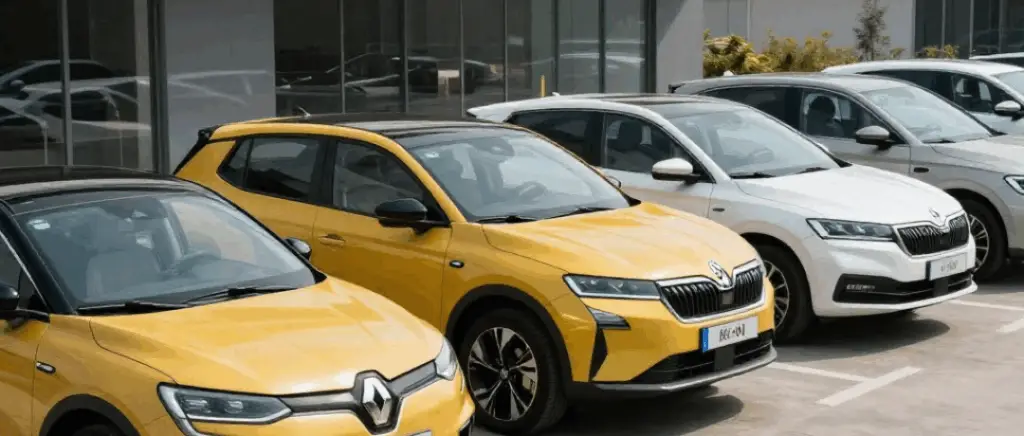Monday to Friday
9am - 12.30pm - 2pm - 7pm
Regulations in force
In France, several laws and regulations, including the Civil Code and the Consumer Code strictly regulate the termination of leasing contracts for electric cars.
Laws and rules to know when returning your leased electric car
According to Article L. 211-14 of the Consumer CodeHowever, the lessee must comply with certain conditions. On return, the electric vehicle must be :
- proper maintenance: carrying out the servicing and maintenance operations specified in the hire contract (inspections, technical reviews, etc.),
- good state of repair: return the electric vehicle having made all repairs to any damage that may have occurred during the rental period,
- good general condition: a vehicle undergoes normal wear and tear during use, and this type of damage (scratches, paintwork, dents) will not be your responsibility.
If these requirements are not met, the owner has the right to claim compensation. So, as you can see, it's crucial to carry out regular maintenance, to clean the interior and exterior of your electric vehicle thoroughly, and to make sure that you carry out an inventory of fixtures before returning it. It should be noted that these regulations are also governed by Article 1722 and Article 1723 from Civil Code.
What are the key dates and deadlines to remember?
To ensure that the return of your leased electric vehicle goes as smoothly as possible, there are a number of steps to take:
- respect the return date stipulated in your leasing contract. Your financial institution will usually notify you of this date by post,
- return? buy back? or lease a new model? - Think in advance about the choice you will make at the end of the contract,
- to make an appointment in advance, we recommend that you arrange a meeting with your landlord to agree the details.
For more information → Vehicle hire: applicable regulations
What termination options are available?
The end-of-contract options for an electric car lease include buying the vehicle, renewing the lease or returning the electric vehicle. Each of these options has its advantages and disadvantages, tailored to different financial situations.
Renewing your electric car lease: same vehicle or new model?
Renewing your lease as part of an electric car contract is one of the options available when your LOA (Hire with purchase option) is coming to an end.
| Garder le même véhicule | Choisir un nouveau modèle |
|---|---|
|
Benefits
|
Benefits
|
|
Knowledge of the vehicle, its condition and maintenance
|
Benefit from the latest innovations and technologies
|
|
No acquisition costs
|
Choosing an electric vehicle better suited to your needs and expectations
|
|
Less financial commitment
|
|
|
Disadvantages
|
Disadvantages
|
|
Obsolete technologies and innovations
|
Requires a new financial commitment
|
|
Less flexibility when needs change
|
Potentially higher monthly payments
|
So there's no single best solution when it comes to end-of-lease options for electric cars, depending on both your expectations and your needs.
How do you know if buying back your car is a good idea?
Opting to buy back your electric vehicle depends on a number of factors. The satisfaction you get from your current electric vehicle and the fact that you don't need a new model make buying back more attractive.
You should also assess the condition of the vehicle, as a well-maintained electric car increases the likelihood of a buy-back value. Finally, it's a good idea to keep an eye on the market. Buyback offers vary according to model and supplier, so it's important to compare before deciding.
Buying back an electric vehicle allows you to become the owner and stop paying monthly lease payments. In return, you will have to pay the buy-back price and all maintenance and repair costs will be your responsibility.
In short, there is no firm answer to the question of buying back your electric vehicle. Just like the choice of keeping the electric vehicle or choosing a new model, the best decision is the one that meets your needs and expectations.
To help you make the right decision, we recommend that you :
- draw up an inventory of your vehicle needs and desires,
- carry out a full diagnostic to assess the condition of the vehicle,
- weigh up the buy-back offers from various suppliers,
- inform you about the maintenance and repair costs associated with an electric vehicle.
Ask yourself the right questions:
- Am I satisfied with my current vehicle?
- Is my vehicle well preserved?
- Am I prepared to pay for maintenance and repairs?
End of electric car leasing contract: comparing options
Choosing the best option for ending your electric car lease is an important decision, as it can have a significant impact on your budget.
Which is the most cost-effective way to end an electric car lease?
A number of criteria can influence the answer to this question. A well-maintained electric vehicle will have a higher trade-in value.
It will also depend on the vehicle's residual value (the amount representing the possible resale price of the car). The cost of repairing the vehicle is another factor to consider. If the vehicle is in poor condition, the repair costs will be borne by the lessee.
Generally speaking, a trade-in by the lessor is the least advantageous option. The lessor tends to offer a trade-in value that is lower than the vehicle's residual value.
Selling the vehicle to an individual or a professional is the most lucrative option, although it is also the most perilous. The final sale price of the vehicle remains unpredictable.
Finally, buying an electric vehicle is an attractive alternative if it is in good condition and the lessee wants to keep it. They can then take advantage of an attractive discount.
Here is a more concrete example to give you a better idea of the different end-of-lease alternatives for a small business. electric city carthe Renault Zoë e-Tech :
|
Residual value (after 4 years)
|
20 000 €
|
|
Restoration costs
|
2 000 €
|
|
Takeover offer from the lessor
|
15 000 €
|
|
Selling price of the vehicle to a private individual
|
25 000 €
|
|
Vehicle purchase price
|
18 000 €
|
In this case, selling the vehicle to a private individual is the most advantageous option. The lessee will record a capital gain of €5,000.
What are the tax advantages for companies and individuals leasing electric cars?
Regardless of your status, whether you are an individual or a company, electric car leasing offers some interesting tax advantages. Eco-responsible vehicles such as electric cars benefit above all from exemptions and a reduction in the TVS (Company car tax), for a period of eight quarters.
Private individuals can obtain an ecological bonus when they buy or lease an electric car. It amounts to 27 % of the purchase price, up to a maximum of €5,000, provided the price of the vehicle does not exceed €47,000 and the vehicle weighs no more than 2.4 tonnes. For households with incomes of €14,089 or less, the eco-bonus can be as much as €7,000.
Electric cars benefit from an exemption from Taxe sur les Véhicules de Sociétés (TVS) for several years, and an exemption from registration tax in certain regions.
Low-income households will be able to lease an electric car for €100 a month from the second half of 2023.
Companies, for their part, can reduce their tax bill by implementing environmentally-friendly practices. They can receive grants of up to €6,000 for the purchase of a electric van.
Also read → 2023 tax benefits for electric vehicles
Conclusion
There are a number of options when it comes to ending a leasing contract for electric cars. Whether you choose to purchase the vehicle, renew the lease or return the model, each alternative has its own particular requirements. It's important to carefully consider your financial situation and needs, and weigh up the pros and cons before deciding.
For more information, we've put together a guide to this topic to explore the different aspects in depth:
Read our article about :
Ready to take the plunge? Contact our experts Beev if you have any questions. We'll get back to you within the hour!




































